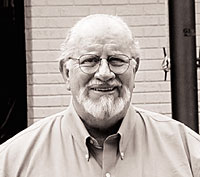Legendary Atlanta studio pioneer, Bob Richardson, died in Stuart, Florida on April 15, 2003. Prior to his retirement in 1992, Richardson’s career had embraced the whole of modern recording history. As an aspiring engineer in the 1950’s, he taped regional bands in his North Carolina basement. In 1966, he recorded The Swingin’ Medallions’ fraternity anthem, “Double Shot (of My Baby’s Love)”. Beginning in 1972, Richardson’s Atlanta studio, Mastersound, became one of the first American studios to have full console automation, multiple 24-track synchronizations, and Quadraphonic mixing capability, making it a haven for such R&B titans as Isaac Hayes.
 Born in Charlotte, North Carolina in 1927, Bob Richardson was a professional musician by age 14, playing upright bass around his hometown during World War Two years. He worked briefly for National Shirt Shops, and Richardson always credited his youthful background in retail for the business skills he would require to survive in the music industry. As District Sales Manager for Columbia Records, Richardson’s frequent visits to Nashville recording facilities compelled him to build his own studio in his Charlotte home in 1958. Using an Ampex 300 tape deck, he scored a modest success with The Delacardos’ “On The Beach” (Imperial 5992) in 1962.
Born in Charlotte, North Carolina in 1927, Bob Richardson was a professional musician by age 14, playing upright bass around his hometown during World War Two years. He worked briefly for National Shirt Shops, and Richardson always credited his youthful background in retail for the business skills he would require to survive in the music industry. As District Sales Manager for Columbia Records, Richardson’s frequent visits to Nashville recording facilities compelled him to build his own studio in his Charlotte home in 1958. Using an Ampex 300 tape deck, he scored a modest success with The Delacardos’ “On The Beach” (Imperial 5992) in 1962.
As a regional rep for Mercury Records in the early Sixties, Bob Richardson visited an Atlanta photo session for Ray “Ahab the Arab” Stevens, where he first met music publisher Bill Lowery. Sensing a solid opportunity, Richardson relocated to Atlanta and became partners with Lowery in the early Mastersound studio, located in an old suburban schoolhouse. Richardson was soon engineering hits for the performers associated with the Lowery publishing and production company. In 1965, he tracked Billy Joe Royal’s classic, “Down In The Boondocks”, and, later, the Classics IV 1967 chart-toppers “Spooky” and “Stormy.”
These were the days before the mass manufacture of recording consoles; Mastersound used a custom board designed by the inventor Jeep Harned, who would presently establish an international reputation as the sole owner of MCI, builders of modern studio gear. Richardson and Harned formed a lifelong association that would only end with Harned’s recent death on March 13, one month in advance of Richardson’s passing.
In the early 1970s, Richardson built the new Mastersound studio in midtown Atlanta, which he managed with his wife, Babs. Lou Bradley, the renowned Nashville engineer/producer, comments, “Bob had a dream to build and own a recording studio, and he did. He was a bulldog.”
Richardson’s sharp entrepreneurial instincts provided a motivation that kept him well in advance of technological developments. The Mastersound facility was designed by Tom Hidley and George Augspurger, known for their innovative blueprint at Westlake Studio in Los Angeles. Jeep Harned installed one of the early automated consoles on the East Coast. Later, when Mastersound became one of the first (and few) Quadrophonic studios in America, Harned retrofitted his deck with special panning and bussing capabilities.
Richardson always saw the need to provide his clients with state-of-the-art gear and quality sound engineers, like Lou Bradley and Joe Neil, whose experimentation he approved. Neil, who joined Mastersound in 1974, successfully modified a video synchronizer in a trailblazing attempt to lock together two 24-track tape machines. Mastersound also became the first Atlanta studio to offer post-production technology for film, even installing a projector booth that doubled as a vocal chamber.
During the 1970s, Richardson remained active as an engineer, recording albums for the “Me and You (and a Dog Named Boo)” soft-rocker Lobo (Of A Simple Man, 1972; Calumet, 1973). Mastersound was used to record “Dueling Banjos,” the soundtrack signature for the Academy Award-nominated Deliverance (1972). In the 1980s, Richardson continued to host Issac Hayes, as well as a broad range of artists like Dionne Warwick, James Brown, Peabo Bryson, and Eddy Arnold. During Atlanta tour stops, Prince and Pink Floyd dropped by Mastersound to work on deadline projects. (A live version of Pink Floyd’s “On the Turning Away” was mixed for video release in 36 hours straight.)
Under Bob Richardson’s direction, Mastersound continued to stay on the cutting edge of the era’s technology, installing one of the first Solid State Logic (SSL) consoles in America.
Mastersound was the first Atlanta studio to purchase a digital multi-track recorder. At the time of his award in 1987, Bob Richardson was the only studio owner and engineer to be inducted into the Georgia Music Hall of Fame.